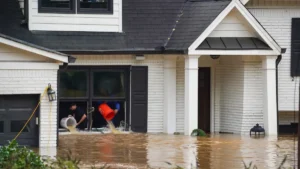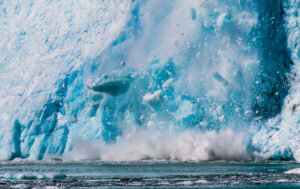Every Vote Is a Climate Vote
There are 123 climate deniers in Congress, including three-fourths of the congressional representatives of Western states. (Image: Adobe)
(Image: Adobe)
The upcoming election may be the most important one of your lifetime. It is no less than a referendum on our climate and our future. It is that serious and urgent.
According to a study by the nonprofit Climate Central, large fires that burn 1,000 acres or more have tripled in the Western United States between 1970 and 2015. Last year was the warmest on record, a trend that is expected to continue. The country has been warming more rapidly than the global average since the late 1970s, and the West and Alaska have been at the forefront of that trend.
Concerns about the economy, housing, transportation infrastructure, farming and public health are climate issues, too — and increasingly so. Any vote this election, whether local or national, will be a vote on the climate.
I’m not trying to fan your doomsday fears. Quite the opposite: I want to try to drive us all into action. We must move from climate despair to climate repair, even though that can feel so abstract and seemingly insurmountable.
Any vote this election, whether local or national, will be a vote on the climate.
One reason climate repair feels out of reach involves the kind of people we’ve been choosing to represent us. Currently, there are 123 climate deniers in the U.S. Congress who have received lifetime fossil fuel contributions totaling $52,071,133, according to data analyzed by the Center for American Progress policy institute. If you live in Wyoming, Montana, Utah, Colorado, Idaho, Arizona, California, Nevada or Oregon, you have elected officials who may be single-handedly blocking the way to climate-friendly policies. Three-fourths of the congressional representatives of Western states publicly claim that climate change isn’t real and are therefore unwilling to invest any time and resources in climate solutions.
These public officials aren’t just refusing to work on solutions to our climate reality — they are outright denying that a problem exists. If that doesn’t make you mad, it should. But what are you going to do about it? Anger, like repair, can be abstract and insurmountable; anger can even be harmful unless we can channel it toward change. Toward votes.
I’ve been thinking a lot about this since last year, when the Pew Research Center found that half of people living in the West said that climate change is going make life in their region harder over the next three decades. As someone who has lived in the Southwest for most of my adult life, I have witnessed those rising temperatures and longer wildfire seasons and worsening drought conditions, and I share in this collective fear.
But here’s what else last year’s Pew data pointed to: Younger adults are more likely than older adults to expect adverse impacts from climate change in their communities. Whether they lean Democratic or Republican or are unaffiliated, people between 18 and 29 say that they are more concerned about climate impacts than those outside that range. The older we get and the farther we live from the reality of wildfires and floods, the less alarmed we seem to be about climate change.
This shouldn’t surprise anyone. Young people have been carrying the climate action torch these last few years, filing lawsuits against Big Oil and protesting fossil-fuel-friendly public officials. And now, less than six weeks before the presidential election, polls are showing that the teenagers and the 20- and 30-year-olds will continue to lead us.
This summer, I spoke with Magaly Saenz, a 33-year-old small-business owner who runs Tres Leches Cafe in Phoenix with her partner. In her free time, she volunteers with Chispa Arizona, a grassroots group that invites local Latinos into environmental justice actions and conversations. She also volunteers with the Sierra Club and the Wilderness Society, advocating for the protection of Arizona public lands.
The older we get and the farther we live from the reality of wildfires and floods, the less alarmed we seem to be about climate change.
“Historically, when our [the Democratic] party is in office, when we have a majority in the House and in the Senate, we get very complacent and we make excuses [for public officials],” she told me. “We’ll say, ‘At least they’re not that guy.’” So, Magaly said, when she compared them to other politicians that were even worse on climate issues, she generally let it go. Magaly told me that she used to be the kind of person who thought of voting as a document you sign every four years. She would cast her vote, but didn’t push to get measures onto the ballot to begin with. Then, five years ago, she began volunteering and protesting, talking with other Latino families and encouraging them to do the same. Her coffee shop has become a hub for grassroots political activism, a place where people come to brainstorm about the best ways to use their civic muscle.
“Younger generations are looking at [most politicians today] and saying, ‘Nope.’ They’re lighting a lot of fires,” she said. “And hopefully this will inspire other people to run for office.”
There is already some change underway: The number of climate deniers in Congress continues to go down — from 150 four years ago, around the time Magaly became politically engaged, to 123 today. If we want to see more public officials embrace climate repair in the way we need, we need to take that one basic first step: Vote for the right people. Do your part. (If you aren’t yet registered to vote, go to: www.usa.gov/register-to-vote.)
“Encounters” is a serial column exploring life and landscape during the climate crisis.
Your support is crucial…With an uncertain future and a new administration casting doubt on press freedoms, the danger is clear: The truth is at risk.
Now is the time to give. Your tax-deductible support allows us to dig deeper, delivering fearless investigative reporting and analysis that exposes what’s really happening — without compromise.
Stand with our courageous journalists. Donate today to protect a free press, uphold democracy and unearth untold stories.









You need to be a supporter to comment.
There are currently no responses to this article.
Be the first to respond.